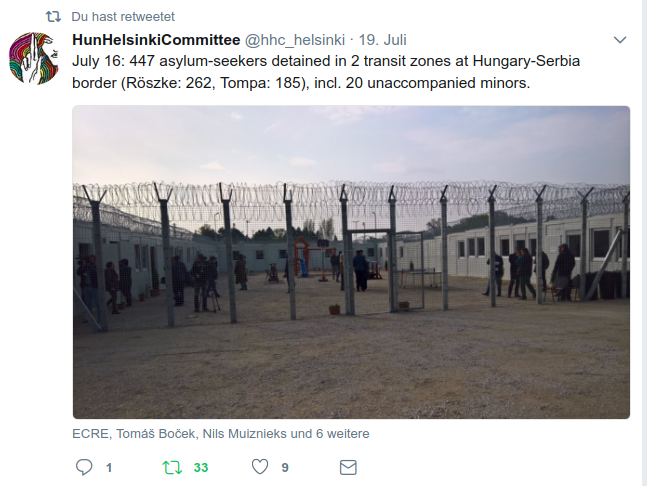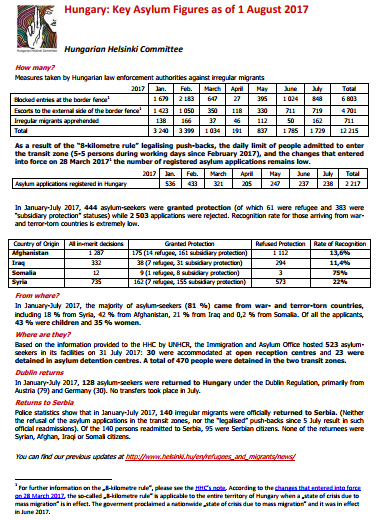The other day I happened upon an opinion piece in Magyar Idők written by Georg Spöttle, one of the many somewhat mysterious national security experts attracted to the Orbán government. He is allegedly a retired German army officer who has permanently settled in Hungary. His background is murky, as one can see from an interview he gave to Magyar Nemzet in 2002. Spöttle’s op-ed piece was supposed to quiet the hysteria created by Magyar Idők, a Fidesz MP, and three mayors in the Lake Balaton area over the vacation plans of Migration Aid for a few asylum seekers. But Spöttle spent about half of the article on the conditions in the two by now infamous transit zones set up by the Hungarian government for refugees waiting for an official decision on their cases.
Alle Beiträge von ms
HUNGARIAN POLITICIANS AND MIGRATION AID’S “MIGRANT RESORTS”
By now, I’m sure, many readers of Hungarian Spectrum who regularly follow the English- or Hungarian-language news from Hungary have heard the story of those refugee families who were offered the opportunity to spend a few days in a village at the edge of Kis-Balaton, a huge wetland habitat. As is clear from the name, the place is only a few kilometers from Lake Balaton. An Austrian benefactor offered three cabins to Migration Aid International, an Open Society Foundation-supported organization that is helping both the refugees who are still being kept in transit zones along the Serbian-Hungarian border and those who have been released and have been granted asylum and are currently under the “protection” (oltalom) of the Hungarian state. In the rest of this post you will see what this “protection” means in the current harsh reality of the Orbán regime. Cutting to the chase: a Fidesz member of parliament, three mayors in the vicinity of those three cabins, and some of the less than charitable and enlightened inhabitants of the three towns swore that no refugee can have a vacation near them. They don’t care about these people’s legal status. They don’t want them nearby. In fact, as one of the mayors said, they don’t want them anywhere in Hungary.
Orbáns moderne Sklaverei
Ministerpräsident Orbán hat Ungarn zum „Arbeitsstaat“ umgebaut und kürzt Sozialleistungen. Im Interview erklärt die Soziologin Zsuzsa Ferge, wie die Regierung Arbeitslose gängelt – und die Wirtschaft des Landes ruiniert.
Fidesz mayors, MPs would prevent refugees from vacationing at Lake Balaton
Local Fidesz mayors and MPs have criticized a plan by a Hungarian aid organization to provide temporary vacation accommodation for refugees near Lake Balaton. Fidesz politicians (and pro-government media lapdogs) claim news of refugee families at public beaches “caused a panic” in the local population. Some mayors vow to prevent the refugees from holidaying in their towns, while others claim the “violent settlement” of the families is all part of the “Soros plan.”
Hungary’s transit zones are prisons where pregnant women are handcuffed and children go hungry
The Hungarian government set up transit zones along the border as a place for those fleeing war to request international protection. These transit zones operate as though they are located in a “no man’s land”. In other words, Hungarian law does not necessarily apply at these locations. Until now, we had no knowledge of what happens behind the gates of these transit zones because the public access to these areas is restricted. We found two families in Serbia who fled the Hungarian transit zones. The respective heads of these families, Labib (L) and Mohamed (M) spoke to us of humiliating treatment, prison-like conditions, and starving children. Tímea Kovács, an attorney with the Hungarian Helsinki Committee, met with asylum-seekers in one of the containers at a transit zone. Kovács spoke to us about handcuffed pregnant women. United Nations High Commissioner for Refugees workers are allowed access to the transit zones. UNHCR press officer Ernő Simon helped us reconstruct what is happening behind the barbed-wire fence.
Ungarisches Helsinki Kommitee: Hungary asylum figures 1. August 2017
Vermehrt Rückschiebungen nach Rumänien


Hungary ignoring court orders to improve border camp conditions
The Hungarian government repeatedly ignored international legal orders to improve conditions for asylum seekers in a controversial border zone camp, according to a human rights group and an asylum seeker held inside the camp.
Fragen des EGMR hinsichtlich der Inhaftierung Minderjähriger in den Transitzonen
The application concerns the possible transfer of the five minor applicants between the ages of 14 and 18 to the guarded transit zone situated on the border between Hungary and Serbia. By force of Government Decree no. 36/2017 (6 March) the Hungarian Government announced a “state of emergency due to mass migration” until 7 September 2017. Several sections of Act no. LXXX of 2007 on Asylum have been modified. The amended law entered into force on 28 March 2017. According to section 1 of the amending act during the “state of emergency due to mass migration”, unaccompanied minors between the ages of 14 and 18 are to be treated as adult migrants and thus they will be transferred to guarded transit zones. Unaccompanied minors under the age of 14 will be allowed to stay in the child protection system outside these zones. According to section 7 of the amending act, during the “state of emergency due to mass migration”, all asylum-seekers will be placed in the transit zone until the asylum proceedings are terminated or until they are transferred to another EU member state under the Dublin Regulation. They are allowed to leave the transit zone only in the direction of Serbia. Furthermore, based on section 9 of the same act, the new provisions shall be applied retrospectively, even with regard to asylum-seekers whose cases were already pending at the entry into force of the new regulation. As a consequence, the transfer of the applicants to the transit zone is likely to take place.
They claim that given their vulnerable status (minors), the prevailing conditions and the risk of chain-refoulement (to Serbia and then the former Yugoslav Republic of Macedonia, eventually driving them to Greece), their confinement in the transit zone for an unknown period of time would amount to inhuman treatment in breach of Article 3 read alone and in conjunction with Article 13 of the Convention. Furthermore, their possible deprivation of liberty in the transit zone would be unlawful and could not be remedied by appropriate judicial review, in breach of Article 5 §§ 1 and 4 of the Convention. Based on the above, on 24 March 2017 the applicants submitted a request for an interim measure under Rule 39 of the Rules of Court. On 27 March 2017 their request was granted.QUESTIONS TO THE PARTIES
1. Would the detention of the applicants, minors, in particular the material conditions at the transit facility in its present state amount to inhuman treatment (see, mutatis mutandis, Popov v. France, nos. 39472/07 and 39474/07, § 102, 19 January 2012)?
2. Before deciding on their expulsion to Serbia, would the authorities consider the applicants’ claim that they would be exposed to a risk of chain-refoulement amounting to inhuman or degrading treatment?
3. Would the applicants have at their disposal an effective domestic remedy for their Convention complaints under Article 3 (see Question 1 above), as required by Article 13 of the Convention, to complain about the material conditions of their detention in the transit zone?
4. Would the applicants be deprived of their liberty in breach of Article 5 § 1 of the Convention in the transit zone (see, mutatis mutandis, Amuur v. France, 25 June 1996, § 38-49, Reports of Judgments and Decisions 1996‑III)?
5. Would the applicants have at their disposal an effective procedure by which they could challenge the lawfulness of their detention, if any (see Question 4 above), as required by Article 5 § 4 of the Convention?
Belegung der Transitzonen


